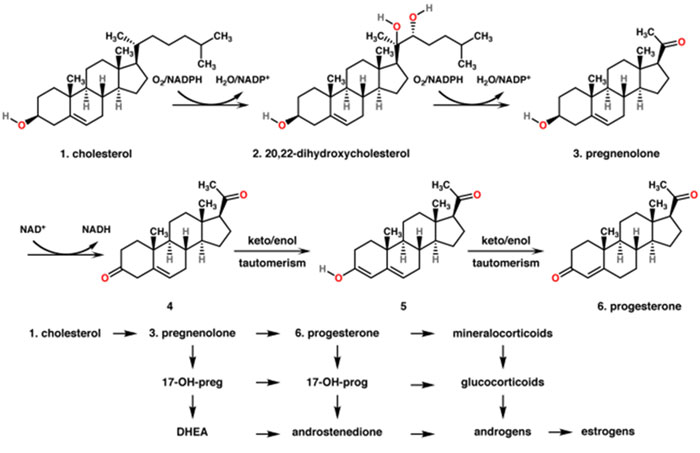Link between Cholesterol and Testosterone Levels
An examination of the link between cholesterol and testosterone levels turns up many similarities between the two, for example:- Testosterone and cholesterol are both steroids sharing a similar chemical structure
- Cholesterol and testosterone are insoluble in blood and other water-based fluids
- Testosterone and cholesterol must bind to other compounds for transport in blood:
- Testosterone binds to sex hormone binding globulin for delivery to testosterone receptor cells
- Cholesterol binds to protein made by liver cells to form lipoproteins allowing cholesterol to reach the tissues and cells in the body by way of the bloodstream
 Cholesterol is called a precursor – through a multi-step process, the body converts it into pregnenolone which is the basis for progesterone. Progesterone is the source hormone for the production of testosterone, estrogen, glucocorticoids, and other hormones.
The cholesterol and testosterone link is crucial to maintain because, without enough cholesterol in the body, testosterone and other hormone levels could plummet, creating widespread physiological breakdown and adverse reactions.
Cholesterol is called a precursor – through a multi-step process, the body converts it into pregnenolone which is the basis for progesterone. Progesterone is the source hormone for the production of testosterone, estrogen, glucocorticoids, and other hormones.
The cholesterol and testosterone link is crucial to maintain because, without enough cholesterol in the body, testosterone and other hormone levels could plummet, creating widespread physiological breakdown and adverse reactions.
The Importance behind Cholesterol and Testosterone in the Body
Two problems that occur with frequency as people age are high cholesterol and low testosterone levels. If the body needs cholesterol for testosterone production, why would this be a problem? First off, there are two different types of cholesterol:- LDL – low-density lipoprotein – the “bad” cholesterol that clogs your arteries with dangerous fatty deposits
- HDL – high-density lipoprotein – the “good” cholesterol that carries extra blood cholesterol to the liver for removal
Why Cholesterol Increases When Testosterone Levels Decline
The high cholesterol testosterone connection can be further illustrated with this explanation: As testosterone levels decline, they interfere with the function of HDL cholesterol to remove any excess LDL cholesterol from the bloodstream. This includes the LDL cholesterol attached to the arterial walls. The connection between cholesterol and testosterone can be seen as LDL cholesterol forms a substance called plaque that builds up on the arterial walls, creating a narrowing effect that makes it hard for blood cells to pass through. *Remember – testosterone and other hormones are also circulating in the bloodstream trying to get through these narrowed and sometimes blocked arteries. Too much buildup of plaque can result in a heart attack if it occurs in a coronary artery. High levels of LDL bad cholesterol and testosterone decline can happen when testosterone signals cannot get through to do their job and deliver crucial messages. These receptor sites need testosterone for proper physiological functions, cognition, memory, mood, and well-being. As the levels of cholesterol affect testosterone, another issue becomes apparent – body fat. Cholesterol comes from healthy fat, something the body requires. Low-fat diets, once viewed as the healthy choice, resulted in people getting heavier and heavier. That is why people who consume daily portions of calorie-laden nuts lose weight and have lower LDL and higher HDL cholesterol and testosterone levels.Get Started




















